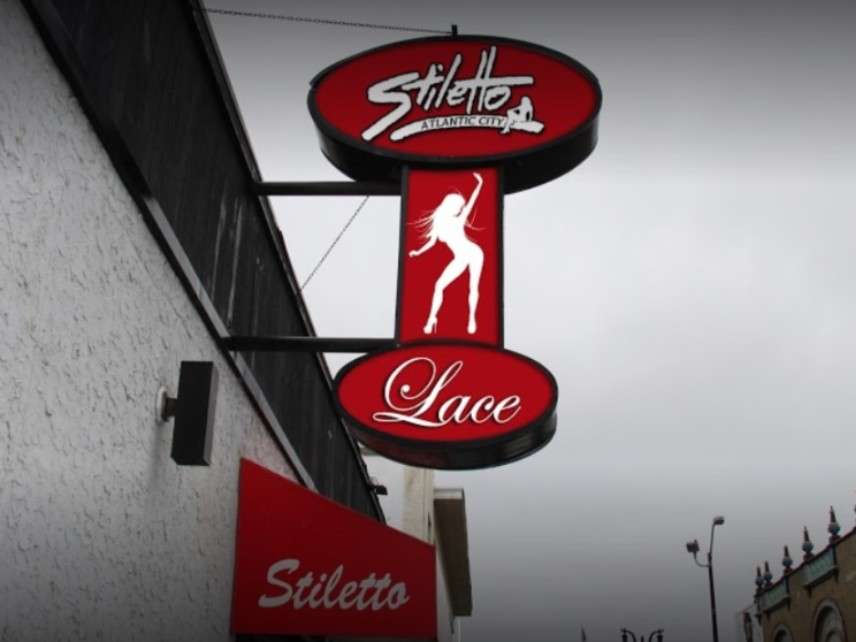First Amendment Victory for Strip Club Gives New Jersey Businesses the Right to Advertise a BYOB Option
A federal judge overturns a state ban on telling customers they can bring their own beer or wine.

In New Jersey, clubs and restaurants that do not have licenses to sell alcoholic beverages may nevertheless allow customers to bring beer or wine to consume on the premises. But they are not allowed to tell customers about that option. Or at least, that was the situation until last week, when a federal judge ruled that a state ban on advertising BYOB policies violates the First Amendment right to freedom of speech.
Stiletto, a strip club in Atlantic City, challenged a New Jersey law that says establishments without liquor licenses (which strip clubs that feature total nudity are not allowed to have) may not "advertise inside or outside of such premises that patrons may bring and consume their own wine or malt alcoholic beverages." Anyone who violates that rule is deemed "a disorderly person," making him subject to fines and loss of BYOB privileges. In a ruling dated November 19, U.S. District Judge Joseph Rodriguez agreed that the law is unconstitutional.
"The State has not identified a governmental interest for its statutory ban on BYOB advertising," Rodriguez noted. That failure makes the law inconsistent with the First Amendment under the "strict scrutiny" that usually applies to content-based speech limits (which requires that they be the "least restrictive means" of serving a "compelling government interest") or under the "intermediate scrutiny" that applies to regulation of nonmisleading commercial speech (which requires that it directly advance a "substantial" state interest and is not more extensive than necessary to accomplish the government's goal).
In this case, New Jersey offered nothing more than boilerplate about "protect[ing] the health, safety, and welfare of the people of the State through the promotion of temperance." It did not explain how letting people know they can bring their own beer and wine is more likely to promote intemperance than advertising the sale of alcoholic beverages, as businesses with liquor licenses routinely do.
"The State Defendants presented no compelling government interest for banning BYOB advertising, while permitting liquor stores and restaurants with liquor licenses to advertise on-site alcohol sales," Rodriguez wrote. "While the State may, and does, regulate conduct regarding alcoholic beverages, it has not shown that regulating the speech concerning that conduct furthers a governmental interest sufficient to override the constitutional rights at stake in this case."
The decision in GJJM Enterprises v. Atlantic City joins a growing list of rulings in which federal courts have rejected arbitrary restrictions on speech about alcoholic beverages, including a Rhode Island ban on advertising liquor prices, a federal law prohibiting brewers from listing alcohol content on beer labels, New York's ban on Bad Frog beer, Michigan's ban on Raging Bitch beer, and a Texas decree that a beer with an alcohol content above 4 percent is an "ale," even when it's a lager. All these cases stand for the proposition that invocations of public safety and public morals are not sufficient to save censorship, even when the subject is booze.
Editor's Note: As of February 29, 2024, commenting privileges on reason.com posts are limited to Reason Plus subscribers. Past commenters are grandfathered in for a temporary period. Subscribe here to preserve your ability to comment. Your Reason Plus subscription also gives you an ad-free version of reason.com, along with full access to the digital edition and archives of Reason magazine. We request that comments be civil and on-topic. We do not moderate or assume any responsibility for comments, which are owned by the readers who post them. Comments do not represent the views of reason.com or Reason Foundation. We reserve the right to delete any comment and ban commenters for any reason at any time. Comments may only be edited within 5 minutes of posting. Report abuses.
Please to post comments


The obvious solution is to ban corkage fees! Woo hoo!
"protect[ing] the health, safety, and welfare of the people of the State through the promotion of temperance."
Thank goodness we have vice laws like these to protect the moral standing of our strip clubs!
New from Beerco, the lager that's an ale!
I was going to say how come ENB wasn't assigned this story, but I see she was working on an article about tax policy.
they are not allowed to tell customers about that option.
Are they allowed to tell customers "Don't even *think* about that option! ***wink-wink*** ?"
*"?*
They are allowed to tell they are not allowed to tell...
And the champagne room. They won't tell you that exactly. You can bet on all of your remaining cash to go away.
But... what about the added economic efficiency a sober workforce will bring? The Eighteenth Amendment hasn't had a fair trial yet. With mebbe a couple thousand more dry killings, banking panics, market crashes and Great Depressions the government could get this right. Re-elect Herbert Hoover, pleeease!
"But... what about the added economic efficiency a sober workforce will bring?"
Assumes facts not in evidence.